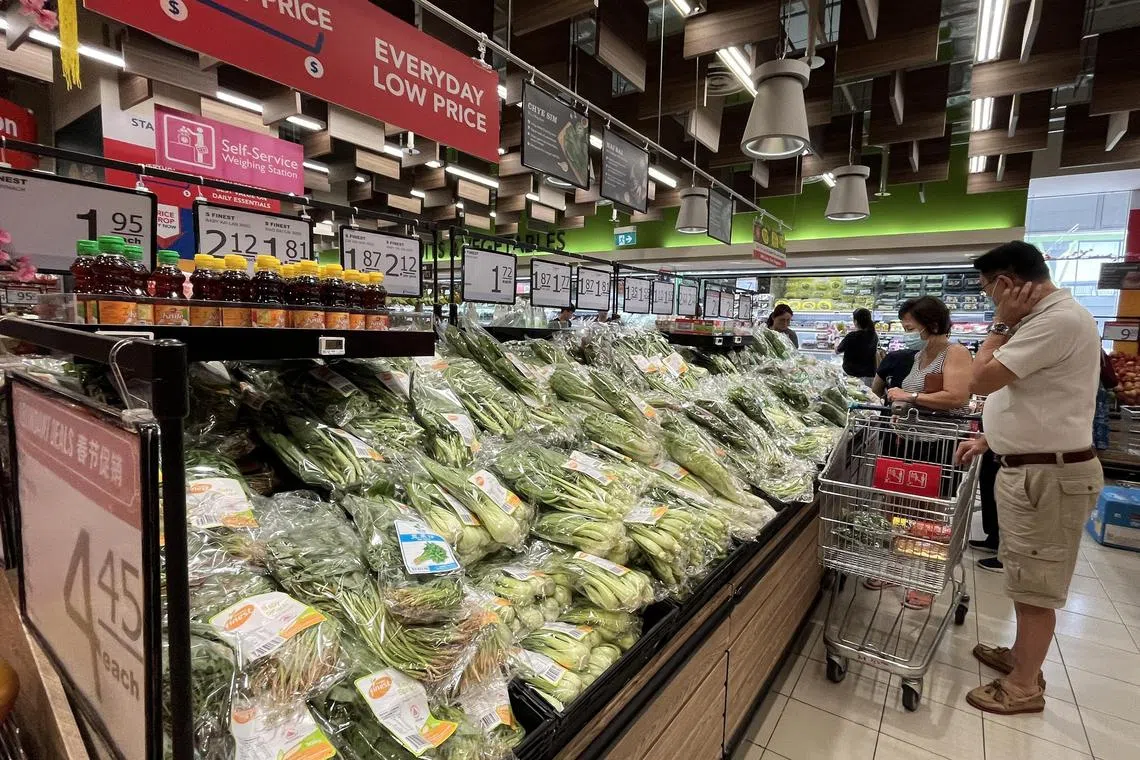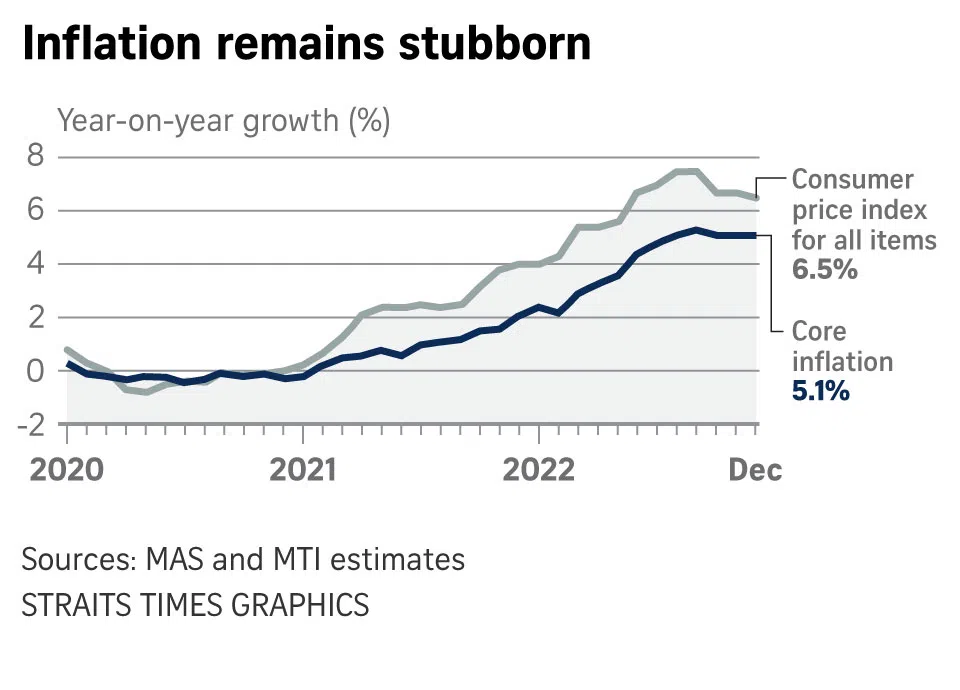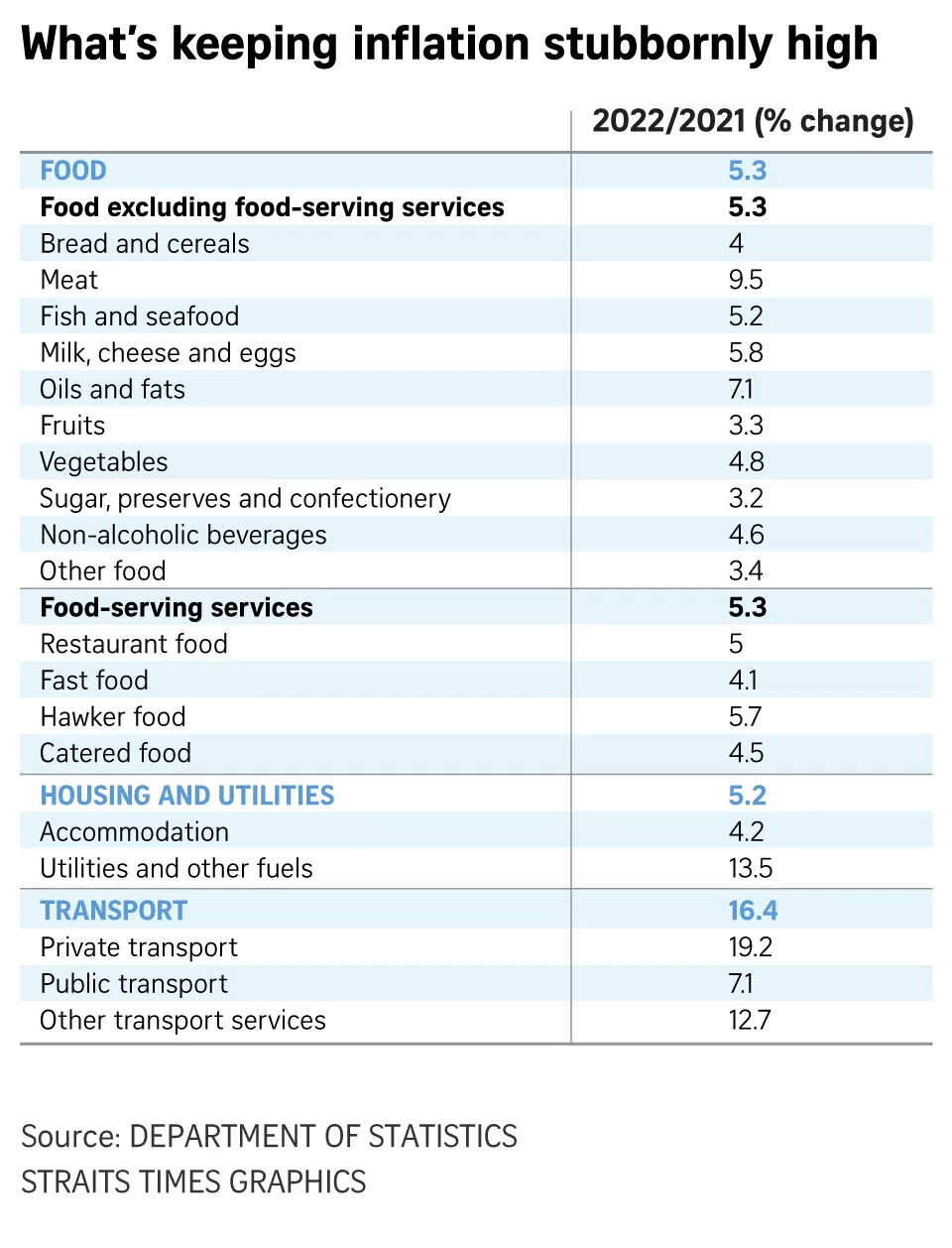Core inflation flat at 5.1% in December, likely to remain elevated for some months
Sign up now: Get ST's newsletters delivered to your inbox

Core inflation for December remained unchanged for the third month in a row.
ST PHOTO: BENJAMIN SEETOR
SINGAPORE – Core consumer prices in Singapore remained stubbornly unchanged for the third straight month, putting a dampener on hopes that they would ease more quickly.
Economists said the data for December also signals that taming core inflation will remain challenging this year, especially with a tax hike factored in. Some, however, expect inflation to taper significantly towards the end of 2023.
Core inflation, which excludes the costs of private transport and accommodation, and reflects the expenses of Singapore households more accurately, came in at 5.1 per cent year on year in December. This was a tad higher than the 5 per cent expected by analysts in a Bloomberg poll.
The figure was unchanged from November
Smaller price increases in December for retail and other goods, as well as electricity and gas, were offset by higher inflation for food and services ahead of Chinese New Year.
December’s headline consumer price index (CPI), or overall inflation, fell to 6.5 per cent from November’s 6.7 per cent, on the back of lower private transport inflation, the Monetary Authority of Singapore (MAS) and Ministry of Trade and Industry (MTI) said on Wednesday. The December figure is also lower than the 6.6 per cent forecast by analysts.
OCBC chief economist Selena Ling said core inflation will remain challenging in 2023, “maybe because of domestic price pressure points”.
These include the 1 percentage point goods and services tax (GST) hike earlier in January, wage inflation due to the still-tight local labour market and food inflation, as well as local companies passing on higher cumulative costs to end-consumers.
“For the man in the street, while they have received additional assistance through the GST Assurance Package and the recent $300 in CDC (Community Development Council) vouchers per household, elevated inflation remains the pressing issue of the day,” said Ms Ling.
For full-year 2022, core consumer prices averaged 4.1 per cent, sharply higher than the 0.9 per cent recorded in 2021. Overall inflation came in at 6.1 per cent, up from 2.3 per cent a year ago.
Both numbers were in line with government estimates.
The official projections for 2023 remain unchanged at between 5.5 per cent and 6.5 per cent for headline inflation, with core inflation at between 3.5 per cent and 4.5 per cent. These estimates take into account the increase in GST.

RHB senior economist Barnabas Gan said Singapore’s inflation risks have dissipated as momentum has slowed as at end-2022, but year-on-year rates remain elevated.
He noted that for most key Asian economies, core inflation momentum has slowed into end-2022 on the back of moderating commodity prices and easing supply chain congestions.
“For that matter, on the back of a potential MAS monetary policy tightening in April 2023, we think that both headline and core inflation will decelerate to their 3 per cent and 2 per cent handle by the fourth quarter of 2023.
“The caveat to this view is centred on the uncertainties surrounding global geopolitical tensions and pandemic-related risks, which may re-elevate supply chain congestions should these exacerbate further,” Mr Gan said.
UOB senior economist Alvin Liew thinks the stubborn core inflation means that the official outlook for prices remains unchanged, and inflation risks also remain on the upside.
He maintained UOB’s current set of forecasts – for headline inflation to average 5 per cent and core inflation to average 4 per cent in 2023, including GST impact.
For December, food inflation rose to 7.5 per cent, up from 7.3 per cent in November, mainly due to higher non-cooked food prices.
Services inflation climbed to 3.7 per cent from 3.6 per cent, led by a larger increase in the cost of holiday expenses.
Meanwhile, private transport inflation eased the most, moderating to 15.5 per cent as car and petrol prices went up at a more gradual pace. It was 17.2 per cent in November.
Prices of retail and other goods slowed to 2.8 per cent on the back of a fall in the cost of telecommunication equipment and personal effects, as well as smaller price hikes in clothing, footwear and household durables.
Accommodation inflation edged down to 4.7 per cent as housing rents rose at a slower pace, while electricity and gas inflation dipped to 16.5 per cent given the smaller rise in prices.
Core inflation is projected to stay high in the first half of 2023, before slowing more discernibly in the second half as the current tightness in the domestic labour market eases and global inflation moderates, MAS and MTI said.




